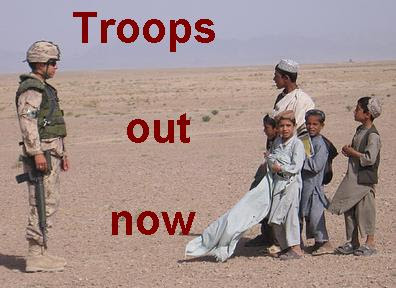Why Canada Should Withdraw

Afghanistan: Why Canada Should Withdraw Its Troops
by Michael Skinner
The Afghanistan Canada Research Group was formed in 2006 by a group of York University graduate students concerned with the Canadian Mission in Afghanistan. The focus of our work over the past two years was to document Afghan opinions of the international intervention in Afghanistan.
In June and July of 2007, I spent five weeks travelling in Afghanistan with another researcher Hamayon Rastgar. ...
[T]he high number of grievances Afghans expressed in opposition to the international intervention we recorded suggests there may be far less support for the military mission than some polls suggest. ...
Afghans expressed to us numerous grievances regarding the international intervention: 1) the international military forces are causing high numbers of civilian casualties, displacing populations, arbitrarily arresting and detaining people, and generally humiliating Afghans; 2) the international intervention has reconstituted the theocratic regime first instituted by force with American support, in 1992, and has rewarded warlords who are accused of war crimes; 3) the international community has not reconstructed the essentials of public infrastructure in any systematic way; and 4) promises of liberating women are perceived as not only ineffectual, but intentionally deceptive. ...
We had a close encounter, when our taxi driver mistakenly pulled into an intersection in front of an ISAF convoy. Our driver stated we were fortunate the soldiers were Turkish rather than Canadian or American, because the Canadians and Americans are known to shoot the occupants of the car in such cases. ...
We were told that, if insurgents are suspected of staying in a village, the villagers are given twenty-four hours notice by the Canadian Forces to evacuate or else risk death. After the evacuation, every building, water well, and any other place weapons could be hidden is destroyed. After thoroughly sweeping the village for weapons caches -- a process that can take days -- the villagers are allowed to return to care for their parched livestock and wilted crops and to rebuild their homes and livelihoods.
One of our sources stated: "For some reason, the Canadian officers are mystified when these people become refugees, instead of undertaking the nearly impossible task of rebuilding their lives from scratch." ...
Many Afghans reminded us that Afghanistan had always been a secular state until the mujaheddin instituted the Islamic Republic of Afghanistan, in 1992. ...
Afghanistan remains a theocratic state today, thanks to the current international military mission. This is despite the United Nations Security Council Resolution 1378, 14 November 2001, which expressly states a new Afghan government should respect freedom of religion, which also implies freedom of secular beliefs.
The commitment to religious freedom made by the UN Security Council was overturned at the Bonn Conference, where it was decided Afghans have the right "to freely determine their own political future in accordance with the principles of Islam" (Bonn declaration). ...
Many Afghans reminded us that the drafters of the Bonn declaration also expressed "their appreciation to the Afghan mujahidin . . . whose sacrifice has now made them both heroes of jihad and champions of peace, stability and reconstruction of their beloved homeland, Afghanistan. . ." (Bonn declaration). ...
Many Afghans reminded us that the military leaders of the Northern Alliance -- the same warlords accused of multiple war crimes and crimes against humanity and the same leaders who first instituted the repressive and misogynist regime of the original Islamic Republic of Afghanistan -- now form the core of the ruling and business class of the reconstituted Islamic Republic of Afghanistan. ...
Peter MacKay claims: "More than 80 per cent of Afghans have access to basic health care today"...
But in reality, few Afghans have access to adequate medical care. The Afghanistan Research and Evaluation Unit (AREU) reports: "The healthcare statistics many policymakers cite are exaggerated; living in a district where a healthcare facility exists in no way means people have real access to these services; and services are often of poor quality and facilities cannot meet the high demand" ("Afghanistan's Health System Since 2001," AREU, Dec. 2006).
An investigation of CIDA's claims of improving healthcare states: "We could not find evidence of CIDA work or CIDA funded work at Kandahar hospital that matched the information given to us by CIDA. . . . there were 28 children sharing 8 beds" ("The Canadian International Development Agency in Kandahar: Unanswered Questions," Senlis Council, 2007). ...
The international forces claim they cannot construct development projects without first stabilising the security situation -- a claim met by incredulous disbelief by Afghans who must live in this environment.
We witnessed disgusting scenes of abject poverty immediately outside the walls of the American embassy -- within sight, earshot, and I suspect smelling range of American embassy officials. This is a neighbourhood which, along with most of Kabul, has been secure since 2001, so claims that reconstruction must wait for stabilisation obviously do not apply. The smell of sewage and garbage is overpowering. Children line up throughout the day at water taps -- sometimes waiting for hours -- for water to be turned on. ...
We also witnessed the construction of a new shopping centre across the street from a bombed-out school. After six years of occupation, students still study in this shell of a school without protection from the weather, but a tiny minority of wealthy Afghans and international workers will soon have a new place to shop. ...
Many Afghans find the rationalisation of the international forces hard to believe when many areas of Afghanistan are obviously considered stable enough to construct commercial developments that make a few people rich, but apparently not stable enough to construct social developments that could benefit all Afghans. ... (link to pdf of Manley panel submission)


1 comment:
Good stuff, I anticipate reading even more.
Hotels In Lisbon
Post a Comment